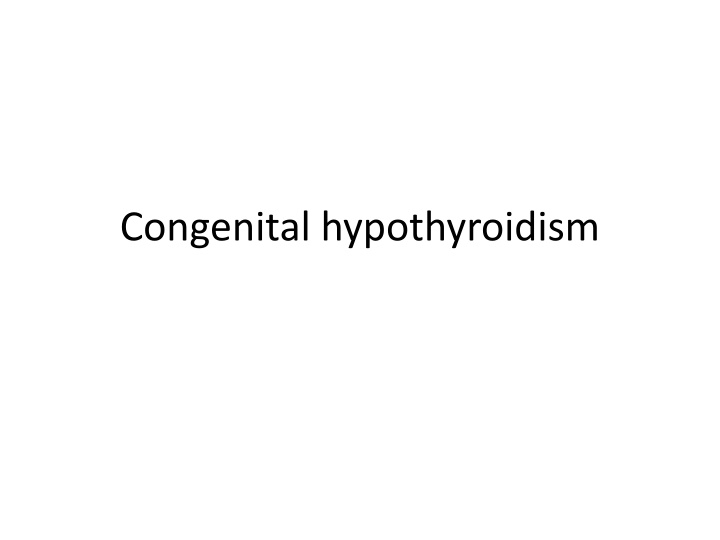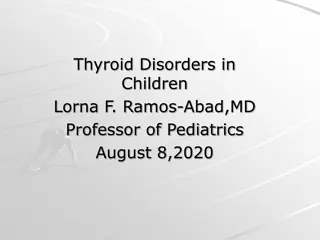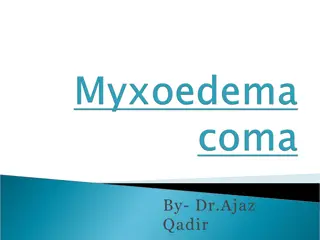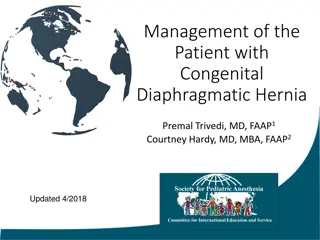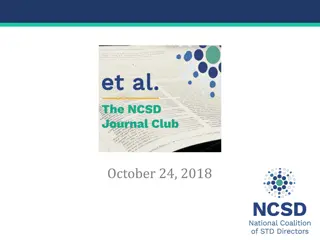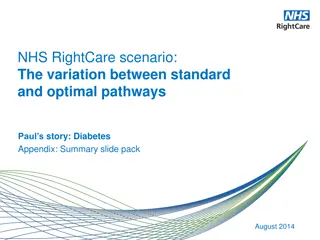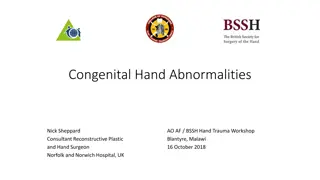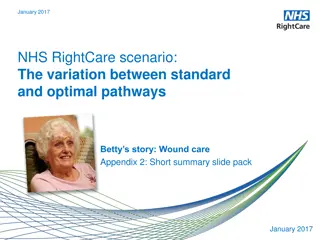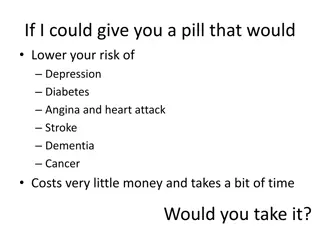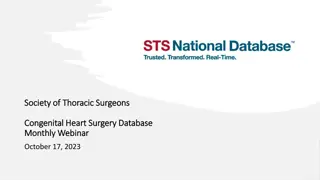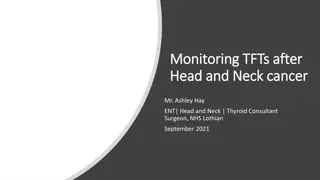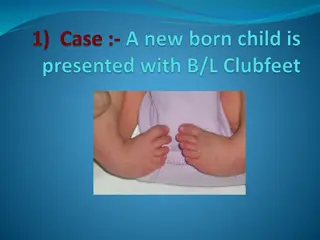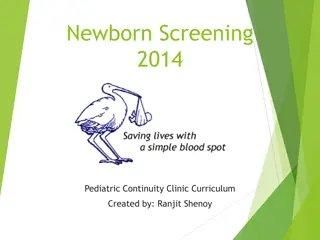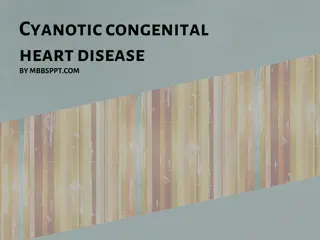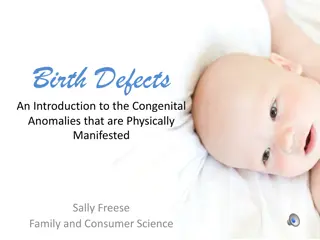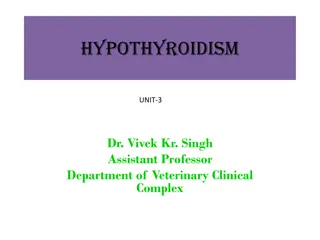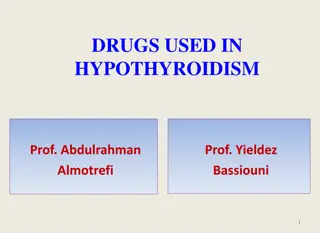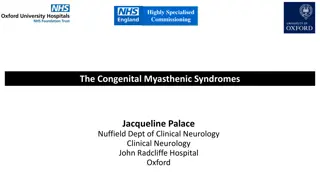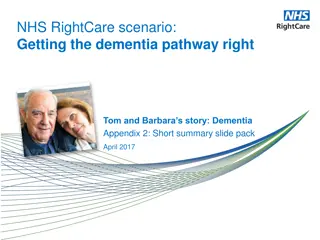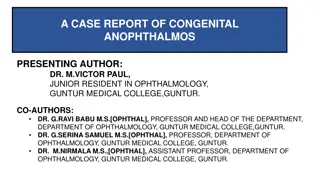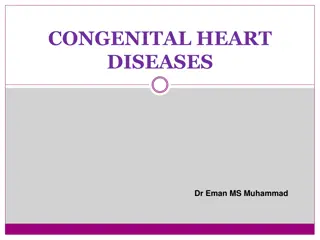Optimal Management Strategies for Congenital Hypothyroidism
Congenital hypothyroidism requires early diagnosis and prompt treatment initiation for optimal outcomes. Factors influencing treatment success include the age of starting treatment, severity of hypothyroidism, starting dose of medication, and ongoing monitoring of thyroid levels. Studies suggest that early treatment within the first 10 days of life and appropriate medication dosing are crucial for ensuring good cognitive and developmental outcomes. Additionally, understanding foetal thyroxine physiology and the importance of achieving euthyroidism before the third week of life contribute to effective management strategies for congenital hypothyroidism.
Download Presentation

Please find below an Image/Link to download the presentation.
The content on the website is provided AS IS for your information and personal use only. It may not be sold, licensed, or shared on other websites without obtaining consent from the author.If you encounter any issues during the download, it is possible that the publisher has removed the file from their server.
You are allowed to download the files provided on this website for personal or commercial use, subject to the condition that they are used lawfully. All files are the property of their respective owners.
The content on the website is provided AS IS for your information and personal use only. It may not be sold, licensed, or shared on other websites without obtaining consent from the author.
E N D
Presentation Transcript
Articles of interest van Trotsenburg P, Stoupa A, L ger J, Rohrer T, Peters C, Fugazzola L, Cassio A, Heinrichs C, Beauloye V, Pohlenz J, Rodien P, Coutant R, Szinnai G, Murray P, Bart s B, Luton D, Salerno M, de Sanctis L, Vigone M, Krude H, Persani L, Polak M. Congenital Hypothyroidism: A 2020-2021 Consensus Guidelines Update-An ENDO-European Reference Network Initiative Endorsed by the European Society for Pediatric Endocrinology and the European Society for Endocrinology. Thyroid. 2021 Mar;31(3):387-419. Donaldson M, Jones J. Optimising outcome in congenital hypothyroidism; current opinions on best practice in initial assessment and subsequent management. J Clin Res Pediatr Endocrinol. 2013;5 Suppl 1(Suppl 1):13-22. Rastogi MV, LaFranchi SH. Congenital hypothyroidism. Orphanet J Rare Dis. 2010 Jun 10;5:17. FACTORS AFFECTING OUTCOME age of starting treatment severity (free T4 <5pmol/L) starting dose of LT4 monitoring to keep T4 and TSH levels in the target range in the first 2 to 3 years of life
Optimal age of starting treatment (1) 2 studies showed no difference in cognitive outcome between patients and sibling controls. One study had mean age of starting treatment of 9 days and dose 10 - 15 g/kg and the other study had median age of diagnosis and starting treatment of 8 days and dose 13.5 g/kg 2 studies which showed an IQ gap between patients and sibling controls. In these studies, the average age of starting treatment was 24 days and average starting dose <10 g/kg Based on these 4 studies, the authors concluded that even a child with severe HT can achieve a good cognitive outcome if treatment is started before 10 days and starting dose is at least 10 g/kg with 15 g/kg in severe cases van Trotsenburg P, Stoupa A, L ger J, Rohrer T, Peters C, Fugazzola L, Cassio A, Heinrichs C, Beauloye V, Pohlenz J, Rodien P, Coutant R, Szinnai G, Murray P, Bart s B, Luton D, Salerno M, de Sanctis L, Vigone M, Krude H, Persani L, Polak M. Congenital Hypothyroidism: A 2020-2021 Consensus Guidelines Update-An ENDO-European Reference Network Initiative Endorsed by the European Society for Pediatric Endocrinology and the European Society for Endocrinology. Thyroid. 2021 Mar;31(3):387-419.
Foetal thyroxine physiology Foetal thyroid gland becomes functional only in the second trimester Transplacental transfer of maternal T4 Some evidence that neurology can be affected in the foetal stage in severe HT but most cases have good prognosis if mother is euthyroid and iodine replete 30% of T4 at birth is maternal Serum half life of T4 is 6 days Maternal T4 disappears by 2 weeks
Optimal age of starting treatment (2) Psychomotor development at age 10 to 30 months in patients with severe and mild HT who were treated (1) early <13 days or late 13 days and (2) with starting dose of <9.5 g/kg or 9.5 g/kg 4 treatment groups early/high, early/low, late/high, late/low. In severe HT, only the early/high had normal scores. In mild only the late/low had abnormal scores. The authors concluded that optimal treatment includes achievement of euthyroidism before the third week of life by initiation of therapy before 13 days with a levothyroxine dose above 9.5 g/kg Bongers-Schokking JJ, Koot HM, Wiersma D, Verkerk PH, de Muinck Keizer-Schrama SM. Influence of timing and dose of thyroid hormone replacement on development in infants with congenital hypothyroidism. J Pediatr. 2000 Mar;136(3):292-7.
Optimal age of starting treatment (3) IQ of infants treated before 21 days was identical to the IQ of controls whereas the IQ of those treated after this threshold was lower severity of CH and socio-economic levels were similar in all groups Boileau P, Bain P, Rives S, Toublanc JE. Earlier onset of treatment or increment in LT4 dose in screened congenital hypothyroidism: which as the more important factor for IQ at 7 years? Horm Res. 2004;61(5):228-33.
Optimal age of starting treatment (4) 27 patients compared with sibling controls; one group treated before 1 month of age and second group treated after 3 months of age Progressive loss of intelligence potential starts from birth but if treatment is begun before the age of 1 month, then intelligence remains within normal range. The neurological damage seems to originate partly before birth, but more serious injuries arise if treatment is delayed beyond the age of 3 months Virtanen M, M enp J, Santavuori P, Hirvonen E, Perheentupa J. Congenital hypothyroidism: age at start of treatment versus outcome. Acta Paediatr Scand. 1983 Mar;72(2):197-201.
LT4 dose Meta-analysis showed a significant IQ difference in severe v mild CH cases only when treatment was started with an LT4 dose <10 g/kg Aleksander PE, Br ckner-Spieler M, Stoehr AM, Lankes E, K hnen P, Schnabel D, Ernert A, St blein W, Craig ME, Blankenstein O, Gr ters A, Krude H. Mean High-Dose l-Thyroxine Treatment Is Efficient and Safe to Achieve a Normal IQ in Young Adult Patients With Congenital Hypothyroidism. J Clin Endocrinol Metab. 2018 Apr 1;103(4):1459-1469.
Severe HT (1) Cognitive and motor deficits in adults with CH patients checked Started treatment at median age of 28 days (8 - 47 days) Severe CH experience IQ and motor problems in later life No relation between the day treatment was initiated and IQ or motor scores; even within the severe CH group - no beneficial effect of early treatment initiation Conclusion - Severity of congenital hypothyroidism, but not the timing of treatment initiation, is an important factor determining long-term cognitive and motor outcome. Kempers MJ, van der Sluijs Veer L, Nijhuis-van der Sanden MW, Kooistra L, Wiedijk BM, Faber I, Last BF, de Vijlder JJ, Grootenhuis MA, Vulsma T. Intellectual and motor development of young adults with congenital hypothyroidism diagnosed by neonatal screening. J Clin Endocrinol Metab. 2006 Feb;91(2):418-24
Severity of HT (2) Salerno M, Militerni R, Di Maio S, Bravaccio C, Gasparini N, Tenore A. Intellectual outcome at 12 years of age in congenital hypothyroidism. Eur J Endocrinol. 1999 Aug;141(2):105-10. Tillotson SL, Fuggle PW, Smith I, Ades AE, Grant DB. Relation between biochemical severity and intelligence in early treated congenital hypothyroidism: a threshold effect. BMJ. 1994 Aug 13;309(6952):440-5.
